This article is part of a series being shared to highlight activist struggles across Europe and grassroots response to health and economic crisis. These articles are shared in preparation for the event ‘Reclaiming the commons: From austerity and debt to public space and health as commons’ which will take place next Wed 27th Jan.
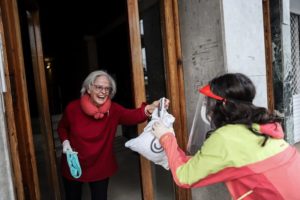
In the preparation for the Common Horizons chapter on public space and common health, we interviewed several people participating in the “que no faltin mascaretes” (no shortage of masks) initiative. A group interview was conducted through a collaborative document, while the team prepared an exhibition in December 2020.
Local experience
The lack of masks and protective equipment in health centres and elderly residences during the first phase of the COVID-19 pandemic confinement (March-June 2020) led to the setting up of a self-organised network for their production and distribution in Premià de Mar (a municipality on the northern coast of Barcelona, in Catalonia) in which about 50 people took part and managed to produce and deliver 4,000 masks. The initiative came from Tela Marinera group, part of an association of families from the Mar Nova primary school, other people joined in later.
TM: Different struggles had united a group of families, the previous one was to prevent the closure of the Mar Nova school. The initiative was born in this group and later expanded.
TM: The initiative came from a member of Tela Marinera who works in the sector of elderly residences and who saw the alarming lack of resources and the need to sew masks. (···) We started by making an announcement to see who needed masks and many people responded. (···) We were about 50 people, basically women. Two men sewed and two more participated in the delivery and sterilization.
TN: One company gave us “trapillo” (cotton string) and several gave us clothes, rubber bands and bias tape. (···) Two companies (a milk producer and a dentistry) offered to sterilize our masks.
SG: It was a way to escape (···) times when I felt accompanied, I could imagine you all sewing and it was a very comforting feeling of community.
C: I was a little depressed. Then, talking to my neighbour who brought me bread daily, she used to lower it to me with a rope from her roof, she told me to look in the neighbourhood’s WhatsApp group, there was a call asking for people to sew masks.
A: I was one of the deliverers (···) the deliveries were quick but they filled you with human warmth, we exchanged smiles and mutual recognition.
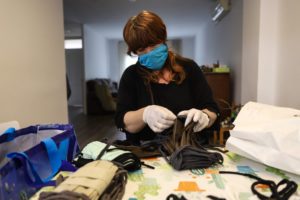
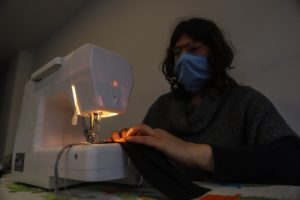
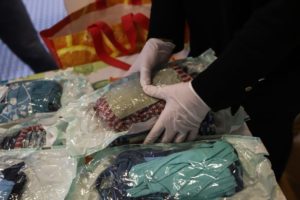
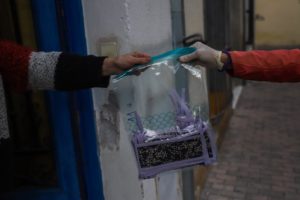
Strategies from a commons approach (opportunities)
TM: We went to the school to get clothes and brought them to the house of A., the logistics centre of the initiative, who lived with M. (her sister) with their small children. There, two of us cut the pieces of clothing and the rubbers and prepared the bags to take to the stitchers. The deliverers collected the bags and delivered them to the homes of the stitchers two or three times a week. Then they would collect the sewn masks and we would give them to the sterilizers. Once sterilized, they were brought back to the logistics centre where they were dried. They were then repackaged and distributed to health centres and homes.
TM: R., who sees everything as easy and fun, did several tutorials. There was a professional stitcher who also sent out tutorials on how to sew gowns. Many people learned how to sew. We learned that if you work in a team you can do very important things.
TM: Both, to seek participants and to get the centres to know about the initiative so we could receive orders, the social networks with the already existing families association accounts were used: Twitter, Instagram and Facebook with the hashtag #QueNoFaltinMascaretes (Catalan for noshortageofmasks). Whatsapp and mobile phone calls were also used to coordinate.
Problems and challenges
Elderly residences were the most affected by the first wave of COVID19 in Spain, with a very relevant number of serious cases and deaths. They suffered an initial phase in which they were neglected by the public administration, without receiving any protective equipment. Professionals in the residences had to get up to speed with very little support and, in some cases, they received it from the nearest community. One of the residences in Premià de Mar (privately owned by a French company, which was later intervened by the administration) very close to the Mar Nova school had a significant number of infections and deaths from COVID19 .
R: For weeks I experienced the worst moments of my professional life as a nurse. (···) There was a lot of urgency, we talked daily with the people in charge of the residences and a lot of material was needed (···) It was not just a group making masks (···) it was moments of sharing and believing that it was possible, and it was possible.
TM: In response to a need, citizen action was taken, almost without our noticing it. We believe that we did an important service during a time when there was nothing.
TM: When we considered making the masks we didn’t know if they would be used, so we called a couple of residences in the area and they said yes, please do it, because it was very necessary.
Open questions and outstanding issues
- How is production and distribution organised in society so that there is no protective health equipment available and that it does not get to where it is most needed?
- What model of ageing and care for the elderly do we have and what role did this model play in what happened in the residences?
- Could this demonstrated capacity for popular self-organisation for distributed production go beyond the spontaneity of the moment and be something we can count on socially? Could this capacity for proximity production be better exploited and be an alternative to the prevailing model of globalised production?
- What other similar experiences have taken place in this crisis and what do they have in common with it?
Other similar initiatives
- Xarxa de Dones Cosidores (Red de Mujeres Cosedoras) of Nou barris, in Barcelona. Referenced in: Teixidora.net · Barcelona.cat · Vídeo en La Veïnal · Etcéteres
- Cosidores del Lluçanès COVID19 in the comarca (region) of el Lluçanès (interior of Catalonia). Referenced in: FB video · Twitter @cosidorllucanes
Leave a Reply